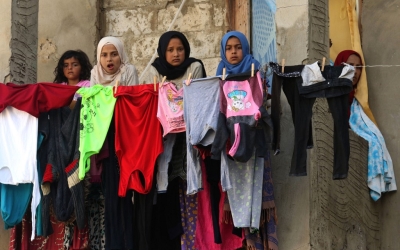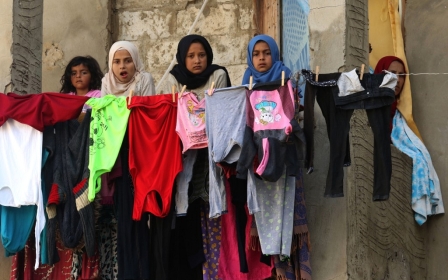Beirut explosion: Gambia accused of ignoring plight of domestic workers stuck in Lebanon

Gambian domestic workers, many of whose lives were disrupted by the Beirut chemical explosion, are questioning their government's commitment to repatriating them after the country's most senior diplomat in Lebanon dismissed their suffering.
A group of 36 women, some injured in the blast, abandoned by employers or forced to flee, took to the streets of the city on Thursday to protest against remarks made by the country's honorary consul in the Lebanese capital, who last week claimed they were "coming up with stories".
'We are living in appalling conditions here in Lebanon. We don't even know where we are'
- Gambian woman
Activists say that time is running out to repatriate the women from a city left in turmoil since the 4 August blast. They said the government of the West African nation was "sleeping" as other African nations were urgently repatriating their people.
The Gambian women are among thousands of domestic workers who were abandoned or forced to flee employers unable to pay them. Lebanon has been staggering over recent months from an economic crisis compounded by the coronavirus pandemic.
The women had worked under the exploitative terms of the kafala system, widespread across Lebanon and parts of the Middle East, which grants employers the power to control their movements and leaves them vulnerable to abuse.
New MEE newsletter: Jerusalem Dispatch
Sign up to get the latest insights and analysis on Israel-Palestine, alongside Turkey Unpacked and other MEE newsletters
Lebanese nationals a priority
Homeless and without pay, most of the women had resorted to living in cramped apartments, sometimes home to more than 30 at a time.
The blast hit one such residence, shattering windows and causing the walls to collapse, a video shows. Some of the women got glass fragments in their eyes and gashes to their feet, hands and heads as a result.
When they sought hospital treatment, they were turned away and told that Lebanese nationals were a priority.
The women, who first began to lobby for repatriation nine months ago, have now stepped up their calls.
"Tell the authorities to help us. It has been months without getting any notification from them," they said in a recording heard by Middle East Eye.
"We are living in appalling conditions here in Lebanon. We don't even know where we are.
"Death is better than how we are living here."
'They just want a free passage'
The women's cause has been taken up by a global network of Gambians.
Lovette Jallow, a Stockholm-based activist, said their situation was desperate.
"Some of them have been injured in the explosion; many of them are runaways from their employers who have abused them," she said.
"All Beirut is in turmoil and they are losing access to survival resources, food, housing, safety. They are losing all of this."
Ammonium nitrate: What is it and how did it get to Beirut's port?
+ Show - HideThere are still many details surrounding the cause of the explosion that devastated much of Beirut on Tuesday that remain murky and unexplained.
However, the Lebanese government has so far indicated that they believe the enormous blast to have been the result of 2,700 tonnes of the chemical compound ammonium nitrate left lying in a warehouse in Beirut port since 2013.
Middle East Eye has compiled a quick guide to the destructive compound and the circumstances surrounding its fateful detonation on Tuesday.
What is ammonium nitrate?
Ammonium nitrate is an industrial chemical commonly used for fertilisers, but also as an explosive, often used in mining.
The chemical, known by the formula NH4NO3, is a naturally white crystalline solid and is often known as saltpetre.
Under most conditions ammonium nitrate is not necessarily dangerous and is relatively stable - it can even be used to smother a fire.
However, if contaminated it can become highly volatile.
What previous incidents have there been?
The most notorious confirmed ammonium nitrate explosion prior to Tuesday was the 1947 Texas City Disaster.
On 16 April 1947, at the Port of Texas City, 2,300 tonnes of ammonium nitrate exploded, killing almost 500 people.
More than 5,000 people were injured and at least 1,000 buildings levelled in the surrounding area.
It was the deadliest industrial accident in US history and resulted in the first-class action lawsuit against the US government on behalf of 8,485 victims.
A more recent incident involving ammonium nitrate took place in 2015 when a series of explosions at a chemical plant in the Chinese port city of Tianjin killed 173 people and injured 798.
Among the blasts at the port was the detonation of 800 tonnes of ammonium nitrate.
Eventually Chinese courts handed jail sentences to 49 government officials and warehouse executives and staff over their involvement in circumventing and loosening safety standards enabling the storage of dangerous chemicals.
How did the chemical end up in the port?
The chemicals originally arrived at Beirut's port on board a Russian-owned cargo vessel flying a Moldovan flag in September 2013.
The shipping monitoring organisation ShipArrested.com at the time reported that "upon inspection of the vessel by Port State Control, the vessel was forbidden from sailing. Most crew except the master and four crew members were repatriated and shortly afterwards the vessel was abandoned by her owners after charterers and cargo concern lost interest in the cargo".
According to documents posted online and seen by Al Jazeera, the ship's dangerous cargo was then offloaded and placed in hangar 12.
Numerous letters were reportedly sent by customs officials, including former director of Lebanese customs Shafik Merhi, to judges between 2014 and 2017 asking for guidance on what to do with the chemicals.
One letter sent in 2016 - which noted there had been "no reply" to previous requests - said the ammonium nitrate was being kept in "unsuitable" conditions.
"In view of the serious danger of keeping these goods in the hangar in unsuitable climatic conditions, we reaffirm our request to please request the marine agency to re-export these goods immediately to preserve the safety of the port and those working in it, or to look into agreeing to sell this amount," said the letter.
Another letter was sent by Lebanese customs administration director general Badri Daher on 27 October 2017 urging a resolution to the situation, in light of "the danger ... of leaving these goods in the place they are, and to those working there".
Last week, such claims appeared to be dismissed by Khalid Hammoud, Gambia's honorary consul in the country, who is of Lebanese descent.
"These girls are not telling the true situation here. They just want a free passage and a full waive of their penalties," Hammoud told Gambia's Standard Newspaper, referring to the fee imposed on those who flee employers.
"But they have no patience and keep coming up with stories, every time putting pressure on every one.
"Lebanon is currently in a mess after this horrific blast and these women should take it easy and not make life difficult for our government back home and us here."
Videos circulating on social media showed the women on Thursday morning holding placards outside Gambia's consulate, furiously knocking on the door and chanting: "We don't need Mr Khalid."
Blame game
Activists have been fundraising and contacting authorities on the women's behalf, but they say Gambia's government has been playing a blame game with the Beirut consulate.
"Our government is just sleeping," said Fatou Jagne, from the Gambia-based Network of Girls Against Human Trafficking.
"When you go to ask them about the girls, they aren't doing anything.
"The consul is not doing anything; the consul is himself blaming the government and blaming these ladies," said Jagne, who spent more than a year as a domestic worker in Kuwait.
'The consul is not doing anything, the consul is himself blaming the government and blaming these ladies'
- Fatou Jagne, campaigner
The government's response contrasts with that of regional heavyweights Nigeria and Ghana, who are already repatriating their nationals from Lebanon.
The Nigerian ambassador in Beirut told MEE this week that the embassy was struggling to cope with the hundreds of women demanding to return, but that two flights had already left this month, with another two planned before mid-September.
With no direct flights between Lebanon and Gambia, Jallow said she has raised funds to fly the girls to neighbouring Senegal, a relatively short road trip away, but inaction from authorities was holding back the process.
"So it's nine months and 21 days and counting since we requested repatriation," said Jallow. "The Gambian government is not acknowledging the problem. They are not giving us any straight answers."
'Spit in my face'
Meanwhile, a Gambian consulate official appeared to rubbish Jallow's efforts, according to a recording of a conversation heard by MEE.
"Who's telling you they're going to help you?" the official can be heard saying to one of the domestic workers. "People like to talk."
"When this woman [Jallow] buys you a ticket, come and spit in my face.
"I give you the authority to come and spit in my face. There are too many people saying we are going to... when it comes to reality nobody will do anything."
Responding, Jallow said: "I'm very used to people underestimating me, and it's not unusual for a Lebanese man to underestimate a Black African woman.
"It also looks extremely unprofessional for a consulate to besmirch the name of the people they are meant to be helping.
"It just reflects very badly on the person the Gambian government has chosen to sit in this position who has these women and many other lives in their hands."
'We will not give up'
The Gambian government and the Beirut consulate did not reply to repeated requests for comment from Middle East Eye.
But in an interview on Gambian television on Thursday evening, foreign ministry spokesman Saikou Ceesay said that "efforts are underway to repatriate Gambians stranded in Beirut".
He added that the honorary consul had processed emergency passports and was now set to arrange plane tickets.
Activists say they will not be giving up until the women are safely home.
"Gambia is Africa's smallest nation. We're only two million people," said Jallow.
"Every single loss of life within and outside the borders of Gambia is a loss that is felt by all of us.
"We rely on the government that we have elected to have our best interests at heart.
"Gambians in the diaspora in Europe and the USA, we are watching this right now and we're feeling this collectively. We cannot give up and we will not give up."
Middle East Eye delivers independent and unrivalled coverage and analysis of the Middle East, North Africa and beyond. To learn more about republishing this content and the associated fees, please fill out this form. More about MEE can be found here.





